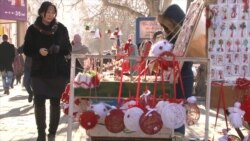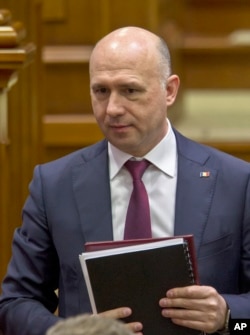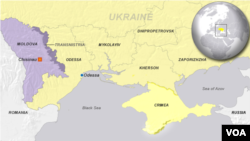A financial crisis in Moldova, one of the poorest countries in Europe, has exposed deep-rooted corruption that is boosting pro-Russia parties and threatening Moldova's stability.
Monthslong protests around government buildings have raised comparisons with the uprising in neighboring Ukraine. Western backers are withholding financial support until the government makes much-needed reforms, but vested interests are slowing progress and exploiting geopolitics.
Protesters in front of Moldova's government building have been collecting signatures calling for snap elections, direct election of the president and elimination of immunity for lawmakers.
They say the government is corrupt and controlled by influential oligarchs, a charge Prime Minister Pavel Filip denied in an exclusive interview Friday with VOA.
"We have sound minds. We wouldn't take on this responsibility if someone from the shadows would be controlling and capturing the state," he said.
But he admitted Moldova officials need to take action to regain public trust.
"Polls also show that people's support level is very low, which means that if we have snap elections now, many of these parliamentary groups would not find themselves in the future parliament," Filip said.
Financial support frozen
Moldova was plunged into crisis after the disappearance of $1 billion — one-eighth of the country's gross domestic product — from banks.
Western backers have frozen financial support until reform targets are met.
"We see that there is really now a need to turn the country around and get the reforms done," said Pirkka Tapiola, European Union ambassador to Moldova. "Because without that, the country will not be able to deliver to its citizens what they deserve and what they expect."
Filip said he and other Moldova officials hope to improve "as soon as possible the relations with the EU countries."
He said his country is counting on resumption of Western support. The International Monetary Fund has a mission in the capital, he said, and "we are having conversations ... to regain a normal relationship that we had a few years ago."
Filip said a signed agreement with the IMF is "a priority," not just because of financial support from that organization. "A relationship with IMF would also mean that there is stability in Moldova. It also unlocks many other funding from foreign partners," he said.
When Moldova signed an association agreement with the European Union in June 2014, it chose "the European path," Filip said. That means "we have to work well internally, to develop the country's economy from the inside so that it becomes attractive for investors and for its citizens," including those who've gone abroad.
Europe or Russia?
But Moldovans also are feeling pressure to look east.
"Unfortunately, lately Moldova's politicians ... have put the citizens in front of a choice: Do you want to go toward Russia or Europe? Because it is simpler to ask this question and it is simple to make a choice," Filip said. "From my point of view it is absolutely wrong, because Moldovan citizens have to be united around other types of ideas — first of all, around the idea of economic development."
Pro-Russia parties are gaining support as some exploit Moldova's flirting with the West. Protest camps established last September raised comparisons with Ukraine's uprising, though all sides are so far showing restraint.
"It's really not about the Russians here. The Russians are not the problem. The problem is domestic," said U.S. Ambassador to Moldova James Pettit. "The problem is homegrown. That doesn't mean that there aren't external powers who might take advantage or who might prefer to see one result over another result. But, again, we do not want to intervene in the internal affairs of Moldova."
Meanwhile, vendors across from the government house sell "Martisor," traditional handicrafts meant to mark a new beginning.







